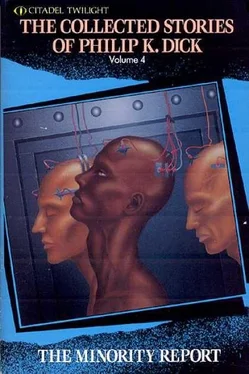" 'Helped'?" Manville said. "Slade, that's hardly the word. Without you there would have been no such work. You, Slade, could be Sir Edward's muse." He leaned back, got out an Upmann cigar, circa 1915, and lit up.
"I think," Slade said, "I'd like to mull this over. I want to be sure I inspire the proper person; I mean, they all deserve to be inspired, but -"
"But you want to find the person in terms of your own psychic needs," Manville agreed, puffing fragrant blue smoke. "Take our brochure." He passed a large shiny multi-color 3-D pop-up booklet to Slade. "Take this home, read it, and come back to us when you're ready."
Slade said, "God bless you, Mr. Manville."
"And calm down," Manville said. "The world isn't going to end… we know that here at Muse because we've looked." He smiled, and Slade managed to smile back.
Two days later Jesse Slade returned to Muse Enterprises. "Mr. Manville," he said, "I know whom I want to inspire." He took a deep breath. "I've thought and thought and what would mean to the most to me would be if I could go back to Vienna and inspire Ludwig van Beethoven with the idea for the Choral Symphony, you know, that theme in the fourth movement that the baritone sings that goes bum-bum de-da de-da bum-bum, daughters of Elysium; you know." He flushed. "I'm no musician, but all my life I've admired the Beethoven Ninth and especially -
"It's been done," Manville said.
"Eh?" He did not understand.
"It's been taken, Mr. Slade." Manville looked impatient as he sat at his great oak rolltop desk, circa 1910. Bringing out a thick metal-staved black binder he turned the pages. "Two years ago a Mrs. Ruby Welch of Montpelier, Idaho went back to Vienna and inspired Beethoven with the theme for the choral movement of his Ninth." Manville slammed the binder shut and regarded Slade. "Well? What's your second choice?"
Stammering, Slade said, "I'd – have to think. Give me time."
Examining his watch, Manville said shortly, "I'll give you two hours. Until three this afternoon. Good day, Slade." He rose to his feet, and Slade automatically rose, too.
An hour later, in his cramped office at Concord Military Service Consultants, Jesse Slade realized in a flashing single instant who and what he wanted to inspire. At once he put on his coat, excused himself to sympathetic Mr. Hnatt, and hurried down the street to Muse Enterprises.
"Well, Mr. Slade," Manville said, seeing him enter. "Back so soon. Come into the office." He strode ahead, leading the way. "All right, let's have it." He shut the door after the two of them.
Jesse Slade licked his dry lips and then, coughing, said, "Mr. Manville, I want to go back and inspire – well, let me explain. You know the great science fiction of the golden age, between 1930 and 1970?"
"Yes, yes," Manville said impatiently, scowling as he listened.
"When I was in college," Slade said, "getting my M.A. in English lit, I had to read a good deal of twentieth century science fiction, of course. Of the greats there were three writers who stood out. The first was Robert Heinlein with his future history. The second, Isaac Asimov with his Foundation epic series. And -" He took a deep, shuddering breath. "The man I did my paper on. Jack Dowland. Of the three of them, Dowland was considered the greatest. His future history of the world began to appear in 1957, in both magazine form – as short stories – and in book form, as complete novels. By 1963, Dowland was regarded as -"
Mr. Manville said, "Hmmm." Getting out the black binder, he began to thumb through it. "Twentieth century science fiction… a rather specialized interest – fortunately for you. Let's see."
"I hope," Slade said quietly, "it hasn't been taken."
"Here is one client," Mr. Manville said. "Leo Parks of Vacaville, California. He went back and inspired A. E. van Vogt to avoid love stories and westerns and try science fiction." Turning more pages, Mr. Manville said, "And last year a client of Muse Enterprises, Miss Julie Oxenblut of Kansas City, Kansas asked to be permitted to inspire Robert Heinlein in his future history… was it Heinlein you said, Mr. Slade?"
"No," Slade said, "it was Jack Dowland, the greatest of the three. Heinlein was great, but I did much research on this, Mr. Manville, and Dowland was greater."
"No, it hasn't been done," Manville decided, closing up the black binder. From his desk drawer he brought out a form. "You fill this out, Mr. Slade," he said, "and then we'll begin to roll on this matter. Do you know the year and the place at which Jack Dowland began work on his future history of the world?"
"I do," Slade said. "He was living in a little town on the then Route 40 in Nevada, a town called Purpleblossom, consisted of three gas stations, a cafe, a bar, and a general store. Dowland had moved there to get atmosphere; he wanted to write stories of the Old West in the form of TV scripts. He hoped to make a good deal of money."
"I see you know your subject," Manville said, impressed.
Slade continued, "While living in Purpleblossom he did write a number of TV western scripts but somehow he found them unsatisfactory. In any case, he remained there, trying other fields such as children's books and articles on teen-age pre-marital sex for the slick magazines of the times… and then, all at once, in the year 1956, he suddenly turned to science fiction and immediately produced the greatest novelette seen to date in that field. That was the consensus gentium of the time, Mr. Manville, and I have read the story and I agree. It was called THE FATHER ON THE WALL and it still appears in anthologies now and then; it's the kind of story that will never die. And the magazine in which it appeared, Fantasy & Science Fiction, will always be remembered for having published Dowland's first epic in its August 1957 issue."
Nodding, Mr. Manville said, "And this is the magnus opus which you wish to inspire. This, and all that followed."
"You have it right, sir," Mr. Slade said.
"Fill out your form," Manville said, "and we'll do the rest." He smiled at Slade and Slade, confident, smiled back.
The operator of the time-ship, a short, heavy-set, crew-cut young man with strong features, said briskly to Slade, "Okay, bud; you ready or not? Make up your mind."
Slade, for one last time, inspected his twentieth century suit which Muse Enterprises had provided him – one of the services for the rather high fee which he had found himself paying. Narrow necktie, cuffless trousers, and Ivy League striped shirt… yes, Slade decided, from what he knew of the period it was authentic, right down to the sharp-pointed Italian shoes and the colorful stretch socks. He would pass without any difficulty as a citizen of the U.S. of 1956, even in Purpleblossom, Nevada.
"Now listen," the operator said, as he fastened the safety belt around Slade's middle, "you got to remember a couple of things. First of all, the only way you can get back to 2040 is with me; you can't walk back. And second, you got to be careful not to change the past – I mean, stick to your one simple task of inspiring this individual, this Jack Dowland, and let it go at that."
"Of course," Slade said, puzzled at the admonition.
"Too many clients," the operator said, "you'd be surprised how many, go wild when they get back into the past; they get delusions of power and want to make all sorts of changes – eliminate wars, hunger and poverty – you know. Change history."
"I won't do that," Slade said. "I have no interest in abstract cosmic ventures on that order." To him, inspiring Jack Dowland was cosmic enough. And yet he could empathize enough to understand the temptation. In his own work he had seen all kinds of people.
The operator slammed shut the hatch of the time-ship, made certain that Slade was strapped in properly, and then took his own seat at the controls. He snapped a switch and a moment later Slade was on his way to his vacation from monotonous office work – back to 1956 and the nearest he would come to a creative act in his life.
Читать дальше










